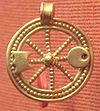Divona (Gaulish: Deuona, Diuona, 'Divine') is a Gallo-Roman goddess of springs and rivers.
The cult of the fresh waters appears to have been particularly important among Gauls, and Celts in general, compared to the other of Indo-European-speaking peoples.
Name
The name Divona ('Divine') is a derivative of the Gaulish word deuos ('god'). Toponymic evidence suggest that sacred springs have been named for the deity, such as Dēouóna (Δηουόνα), the ancient name of Cahors, as well as Divonne and Fosse Dionne.
Attestation and cult practices
In ancient Roman religion, goddesses of freshwater sources are often associated with the deity Fons, god of fountains and wellheads, honored at the Fontinalia for his role in the public water supply for the city. Ausonius invokes fons, the manmade outlet that makes the water available to the people, with a string of adjectives: sacer, alme, perennis, / vitree, glauce, profunde, sonore, illimis, opace, "sacred, life-giving, eternal, / glassy, blue-green, measureless, sonorous, free of mud, shaded." He hails fons as the "Genius of the city" (urbis genius) having the power to offer a healing draught (medico potabilis haustu). In the next line, Ausonius says that this genius or tutelary deity is Divona in the Celtic language (Divona Celtarum lingua), that is, fons added to the divae (plural).
She is hailed (salve, compare Salve Regina) in a Latin poem by Ausonius, the 4th-century Bordelais scholar-poet who was the tutor of the emperor Gratian.
References
- ^ Delamarre 2003, pp. 142–143: "...dérivé fréquent Deuona, Diuona 'Divine' qui semble avoir désigné d'abord une source sacrée (...) et des cours d'eau..."
- Bourgeois 1991a, pp. 7–8.
- Desmet 1998, p. 8.
- Duval 1993, p. 193.
- Ausonius, Ordo nobilium urbium 20.30–31 (Green lines 157–158). The adjectives are masculine to agree with fons and appear in the vocative case, as is customary for a Latin invocation.
- The color word glaucus (Greek glaukos) evokes a range of grey, green, and blue indeterminately, and can often be translated as "sea-colored" or even "sky-colored." It has divine connotations and is associated with various deities, for instance, as the color of Athena's eyes. See P.G. Maxwell-Stuart, Studies in Greek Colour Terminology: ΓΛΑΥΚΟΣ (Brill, 1981), vol. 1, pp. 40–42, and a brief discussion of the color as associated with Pluto.
- The phrase fons addite divis is somewhat difficult to interpret. It is sometimes construed as "fons" addite "divis", that is "Add (plural imperative) the word fons to the word divae/divi" (masculine singular divus). In the plural dative and ablative cases, the masculine and feminine forms are the same, and divis could be either, but Ausonius seems to be connecting the masculine fons to the feminine Divona. In Latin, the word lymphae, plural, means "waters" but is also an Italic word for "nymphs"; a plural divae here might suggest the same tendency to regard water nymphs as both a singular and a plural collective. The verbal form addite, however, can also be construed as a perfect passive participle in the vocative case, parallel in construction with the string of vocative adjectives, that is, "Fons, added to the goddesses." Ausonius "hails" (salve) the "Genius of the city," but genius is not in the vocative case. Fons addite divis is sometimes taken as a proffered etymology: Ausonius may be proposing that the word Divona is formed from the word divus, Gaulish devos, plus fons = -ona, taking fons as the equivalent of a Gaulish word onno, "stream, river," the existence of which is doubtful. The suffix -ona is found in the names of several Gallic goddesses. See Delamarre, Dictionnaire, pp. 142–143 on deuos, including discussion of Divona/Devona; p. 242 on onno; p. 324 on unna, "water(s)". See also George Long, entry on "Divona," Dictionary of Greek and Roman Geography (1854), vol. 1, p. 780; Edward Anwyl, "Ancient Celtic Goddesses," Celtic Review 3 (1906–07), pp. 43–44; Robert E.A. Palmer, Roman Religion and Roman Empire: Five Essays (University of Pennsylvania Press, 1974), p. 264; Ken Dowden, European Paganism: The Realities of Cult from Antiquity to the Middle Ages (Routledge, 2000), p. 54.
- Ausonius, Ordo nobilium urbium 20.30 and 32 (Loeb Classical Library numbering); Divona appears in line 160 in the numbering of R.P.H. Green, The Works of Ausonius (Oxford: Clarendon Press, 1991), p. 175.
Bibliography
- Bourgeois, Claude (1991a). Divona: Divinités et ex-voto du culte gallo-romain de l'eau (in French). Vol. 1. De Boccard. ISBN 978-2-7018-0061-5.
- Bourgeois, Claude (1991b). Divona: Monuments et sanctuaires du culte gallo-romain de l'eau (in French). Vol. 2. De Boccard. ISBN 978-2701800653.
- Desmet, Yves (1998). "Le culte des eaux dans le Nord de la Gaule pendant le haut Moyen Age". Revue du Nord. 80 (324): 7–27. doi:10.3406/rnord.1998.2860.
- Delamarre, Xavier (2003). Dictionnaire de la langue gauloise: Une approche linguistique du vieux-celtique continental (in French). Errance. ISBN 9782877723695.
- Duval, Paul-Marie (1993). "The Religion and Myths of the Continental Celts of Gaul". In Bonnefoy, Yves (ed.). American, African, and Old European Mythologies. University of Chicago Press. ISBN 978-0-226-06457-4.
| Celtic mythology series | ||
|---|---|---|
| Ancient deities of Gaul, Britain and Gallaecia by region | ||
| Supra-regional |
|   |
| Britannia | ||
| Gallia Aquitania | ||
| Gallia Belgica | ||
| Gallia Celtica | ||
| Gallia Cisalpina | ||
| Gallia Narbonensis | ||
| Germania Inferior | ||
| Gallaecia | ||